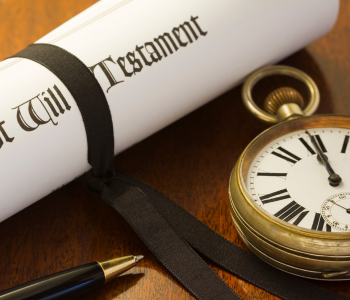What Is An Inherited Property And How Does It Work In Texas?
When a loved one passes away, they may leave behind a property inherited by their family members. An inherited property is a house or land passed down to the next generation through a will or trust.
Inheriting property in Texas involves going through probate court and transferring the title of ownership from the deceased to the heirs. This is a complex and emotional process. Inheriting a property consists of dealing with the legal process while grieving the loss of a loved one.
Understanding how an inherited process works for a successful selling process in the future is essential.
1. A Step-by-step Guide To Handling An Inherited Property In Texas
2. How To Avoid Probate Court When Inheriting A Property In Texas
3. Top Strategies For Selling An Inherited Property In Texas
4. Required Documents For Selling Your Inherited Property In Texas
5. Overcoming Challenges In Selling An Inherited Property In Texas
6. Navigating Taxes When Selling An Inherited Property In Texas
7. The Importance Of Understanding The Bottom Line When Selling An Inherited Property
8. Frequently Asked Questions About Inheriting And Selling A Property In Texas
9. Demystifying The Probate Process For Handling An Inherited Property
10. Preparing Your Inherited Property For A Successful Sale
11. Exploring Different Options And Strategies For Selling An Inherited House
12. Maximizing Tax Benefits When Selling Your Inherited House In Texas
13. The Dos And Don’ts Of Marketing And Advertising Your Inherited House
14. Working With Real Estate Agents To Sell Your Inherited House Efficiently
15. How Much Tax Do You Pay When You Sell An Inherited House In Texas?
16. What Is The Best Way To Sell An Inherited House?
17. How Do You Sell A House When One Owner Is Deceased In Texas?
18. Do All Heirs Have To Agree To Sell Property In Texas?
A Step-by-step Guide To Handling An Inherited Property In Texas

Inheriting a house in Texas could be a blessing or a headache. An inherited property holds sentimental value, and managing it could be challenging.
If you’re going through this situation, it’s necessary to comprehend the process and all the steps involved in selling an inherited house in Texas. The first thing is determining who legally owns the property and obtaining all necessary documents.
You’ll need to assess the property’s condition and decide if any updates are necessary. It’s also important to familiarize yourself with any tax implications from selling an inherited property.
Once you have completed all these steps, you can market the property and start negotiating. Once a sale is closed, appropriately distribute the proceeds among any other beneficiaries or heirs as outlined in the will or by state laws.
You can successfully handle an inherited property by following these steps.
How To Avoid Probate Court When Inheriting A Property In Texas
Inheriting a property in Texas can bring you happiness and other challenges. One of the primary concerns for many heirs is the possibility of going through probate court, which can be time-consuming and costly.
There are always ways to avoid probate court when selling an inherited property in Texas. The first option is to create a living trust that allows the property to be passed directly to beneficiaries without going through probate.
However, there are ways to avoid probate court when selling an inherited house in Texas. One option is to create a living trust, which allows the property to pass directly to beneficiaries without going through probate.
Another way is to utilize the Small Estate Affidavit process, which can be used if the estate’s value falls below a certain threshold. Additionally, it’s essential to keep all necessary documents in order and consult with an experienced attorney for guidance on avoiding probate court when inheriting a property in Texas.
Taking these steps, heirs can successfully navigate the complex legal system and sell an inherited house without going through probate court.
Top Strategies For Selling An Inherited Property In Texas

The process seems challenging if you wonder how to sell an inherited property quickly and efficiently. The good news is that you can successfully sell your inherited property with the right strategy.
Hiring someone who knows the market can provide valuable insights and guide you through the selling process.
Additionally, it’s essential to understand the tax implications of selling an inherited property in Texas and consult a financial advisor if needed. Another critical strategy is appropriately preparing the house for sale by decluttering, deep cleaning, and making necessary repairs or updates.
This can help attract potential buyers and increase the value of your property.
It is essential to price your inherited house competitively based on its condition and location for a successful sale.
Following these strategies for selling your inherited property in Texas can help you confidently navigate the process and maximize your profits.
Required Documents For Selling Your Inherited Property In Texas
If you recently inherited a property in Texas and want to sell it, you must gather many important documents to provide during the selling process. These documents include a copy of the deceased’s will, a death certificate, and proof of your legal authority to sell the property.
You must obtain a tax ID number for the estate and gather any relevant property records, such as deeds or mortgage statements. Additionally, if multiple heirs are involved, you may need to provide documentation of their consent to sell the property.
These documents will ensure a smooth and successful sale of your inherited property in Texas.
Overcoming Challenges In Selling An Inherited Property In Texas

Selling an inherited property in Texas can be challenging. In addition to the legal and financial considerations, the emotional aspect of letting go of a family home.
If the deceased did not leave behind a will or clear instructions, the biggest challenge would be determining who has the legal right to sell the property.
Dealing with debts or taxes on the property can be a potential hurdle. In some cases, the inheritance may even be subject to estate taxes.
Physical obstacles, such as repairs or renovations, may exist to make the house marketable. Fortunately, by educating yourself on these challenges and seeking professional guidance, you can overcome them and successfully sell your inherited property in Texas.
Navigating Taxes When Selling An Inherited Property In Texas
Selling an inherited property in Texas can be complicated, especially when navigating taxes. The first thing to consider is the property’s fair market value at the time of inheritance.
This will determine the tax basis for calculating capital gains tax when the property is sold. Additionally, specific exclusions and deductions, such as the step-up in basis for inherited properties and any improvement costs made on the property, can help reduce tax liability.
It’s essential to consult a tax professional or attorney specializing in estate and inheritance laws to ensure all tax requirements are met, and potential savings are maximized. Failure to follow proper procedures could result in penalties and additional taxes owed.
The Importance Of Understanding The Bottom Line When Selling An Inherited Property

If you are selling an inherited house in Texas, it’s essential to understand the bottom line. This means knowing all the costs of the sale, including any outstanding taxes or liens on the property.
It’s also crucial to consider any potential capital gains tax that may apply. By understanding the financial implications of selling an inherited property, you can make informed decisions and potentially avoid unexpected expenses or complications.
Additionally, a clear understanding of your bottom line can help you determine a realistic asking price for the house and negotiate effectively with potential buyers. Overall, thoroughly understanding the financial aspects of selling an inherited house is essential for a successful and stress-free transaction.
Frequently Asked Questions About Inheriting And Selling A Property In Texas
You may have many questions if you recently inherited a property and want to sell it.
If you are wondering, What are your options for selling the inherited property? Do I need to go through probate? What taxes will I owe on the sale? Can I sell the property if there is a mortgage on it? How long does the process take? These are all valid concerns; understanding the answers can help ease any uncertainty or confusion.
This comprehensive guide will address these frequent questions and provide valuable information to help you confidently sell an inherited house in Texas. If you still want to address some questions, here’s our Frequently Asked Questions Guide.
Demystifying The Probate Process For Handling An Inherited Property

It’s overwhelming and complicated when a loved one passes away and leaves behind a house in Texas, as well as the probate process.
Comprehending the steps involved can help demystify this complex legal procedure.
The first step is determining if the property is subject to probate, as not all inherited assets require this process. If it is, the next step is to apply to the county court.
This will initiate the official transfer of ownership from the deceased’s name to their heirs. A valid will and death certificate are essential for this filing.
Once approved by the court, the executor or administrator of the estate can begin managing and distributing assets according to state laws and any instructions left by the deceased. By understanding and following these steps, handling an inherited property through probate in Texas can be more streamlined and manageable.
Preparing Your Inherited Property For A Successful Sale
The selling process of an inherited property can be stressful, but the proper preparation can lead to a successful sale. Before putting the property on the market, it is essential to prepare it for potential buyers.
It’s important to declutter and deep clean the house, make necessary repairs or renovations, and stage the home to showcase its best features. Gathering all relevant documents and paperwork related to the property, such as titles, deeds, and insurance information, is essential.
Knowing about the market can significantly benefit and prepare your inherited property for sale. Taking these steps can increase the possibilities of a smooth and profitable sale of your inherited house in Texas.
Selling your inherited property in Texas with Home Buying Hounds is as easy and quick! With us, you don’t need to worry about preparing your inherited house; we buy it in As-is condition. If you want more information about who we are, check our About Us section. If you just want to know how we’ve helped other local property owners, check what our clients are saying.
Exploring Different Options And Strategies For Selling An Inherited House

Explore the many options and strategies for maximizing profits when selling an inherited property in Texas. You can sell the property through a traditional agent, which means you may need to wait for potential buyers.
Some people keep their inherited house as a rental or even turn it into a vacation home. The best option is to sell the house to a real estate investor, who will offer you a quick cash sale, so you don’t have to pay commissions or fees; you don’t need to worry about repairs and can close within your timeline.
It’s essential to consider every option to determine which best fits your goals and circumstances. Many factors, such as location, condition, and current market trends, impact decision-making.
When selling an inherited property, exploring different options and strategies is essential. This can help you make an informed decision.
Maximizing Tax Benefits When Selling Your Inherited House In Texas
With knowledge and planning, you can maximize your tax benefits when selling an inherited house in Texas. An essential factor is the property cost basis, the value used to determine capital gains and taxes.
Obtain a professional appraisal or market analysis to determine the value accurately. Repairs or improvements on the property can help you reduce your taxable income by utilizing any available tax deductions.
A critical aspect is comprehending the difference between short and long-term capital gains taxes and how they may apply to your situation. Carefully considering these factors and seeking guidance from a tax professional, you can unlock valuable tax benefits when selling your inherited house in Texas.
A critical aspect is comprehending the difference between short—and long-term capital gains taxes and how they may apply in your situation.
The Dos And Don’ts Of Marketing And Advertising Your Inherited House

Selling an inherited house in Texas can be daunting, especially regarding marketing and advertising. Following certain dos and don’ts when promoting your property is essential to ensure a successful sale.
Using the power of social media and online platforms to reach a wider audience. This includes creating attractive listings on real estate websites and utilizing targeted ads on social media.
Be mindful not to oversell or exaggerate your house’s features, as this may turn off potential buyers. Invest in professional photography and staging services to showcase your home’s best features.
Conversely, traditional marketing methods such as flyers and newspaper advertisements can still effectively reach local buyers. Lastly, avoid using emotionally charged language or personal details about the previous owner in your marketing materials, as this may make potential buyers uncomfortable.
By following these dos and don’ts, you can effectively market and advertise your inherited house in Texas for a successful sale.
Working With Real Estate Agents To Sell Your Inherited House
If you are selling an inherited house in Texas, you can hire an agent to increase your chances for a successful sale. They can guide you through the selling process.
An agent can help you with market research to set the property price and manage paperwork. On the other hand, working with an agent may require waiting until they find the right buyer, which can take months.
Another option for selling your inherited house is to work with a real estate investor who can guide you through the entire selling process and address all your real estate concerns. In addition, you will be selling your property 100% free, paying zero commissions or fees. You don’t need to wait to sell. With Home Buying Hounds, you can close when you are ready. For more information, fill out our short form or contact us at (833) 997-7653.
How Much Tax Do You Pay When You Sell An Inherited House In Texas?
One of the most pressing concerns for sellers when selling an inherited house in Texas is the tax they must pay. While certain exemptions and deductions are available, understanding the tax implications can still be daunting.
When you sell an inherited house in Texas, you may be subject to federal capital gains and state inheritance tax. However, there are exceptions, such as the step-up in basis rule and the $250,000/$500,000 exclusion for primary residences.
It’s crucial to consult with a tax professional or real estate attorney to determine your specific tax obligations and how to minimize them. By doing your due diligence and seeking expert advice, you can unlock the secrets to successfully selling an inherited house in Texas while reducing your tax burden.
What Is The Best Way To Sell An Inherited House?

Selling an inherited house can be stressful, especially if you are unfamiliar with the process. On the other hand, it can be a profitable venture if you have the knowledge and take the right approach.
Certain steps must be taken to sell an inherited house in Texas successfully. It’s important to understand the legal implications, determine the property’s fair market value, prepare the house for sale, and choose the best-selling method.
This guide will unlock the secrets to selling an inherited house in Texas and ensure a smooth and successful transaction.
Home Buying Hounds can help you through the entire process if you want to sell your inherited property in Texas. We can address all your real estate concerns and buy your inherited house for cash. If you want to know more, check out our easy home-buying process.
How Do You Sell A House When One Owner Is Deceased In Texas?
Selling an inherited house in Texas can be challenging and emotional, especially when one of the owners has passed away. In such a situation, legal and logistical considerations must be addressed before putting the property on the market.
The first step is determining who can sell the property, depending on whether there’s a will or if the deceased owner has a trust.
Then, you may need to obtain a court order or letters of testamentary to sell the property. It is also crucial to settle any outstanding debts or taxes related to the inherited house before proceeding with the sale.
This process can be stressful and overwhelming, but with knowledge and a comprehensive guide, you can navigate the complexities and successfully sell your inherited house in Texas.
Do All Heirs Have To Agree To Sell Property In Texas?
The most common question is whether all heirs must agree to the sale. The answer is not as straightforward as one might think.
Most individuals have a common question when selling an inherited property,
In Texas, if the heirs can agree about the property, the law states that all heirs must agree to sell the property unless a specific provision in the will allows one heir to decide on behalf of others. This means that if multiple heirs exist, each one must consent to the sale for it to proceed smoothly.
Some scenarios exist where a court can intervene and allow for a forced sale even if all heirs won’t agree. Individuals must know their rights and options when selling an inherited house. A real estate attorney can help you navigate through this complex process.
| PROBATE LAW | TAX BASED | HEIRSHIP | COMPARATIVE MARKET ANALYSIS | BROKERS | REALTORS |
| REAL ESTATE BROKER | MLS | SALES | PROBATE JUDGE | PROPERTY TAX | PROPERTY TAXES |
| COUNTY CLERK | TAX RATES | STATE ESTATE TAX | PROPERTY OWNERSHIP | OPEN MARKET | IBUYERS |
| INSTANT BUYER | FSBO | FOR SALE BY OWNER | LENDER | CREDITOR | REAL PROPERTY |
| COMPANY | PROPERTY TITLE | PROPERTY OWNERS | SHORT SALE | MONEY | WITHOUT A WILL |
| INTESTATE SUCCESSION | LOAN | LIABILITIES | JUDGE | INVESTMENT | FURNITURE |
| FEE | ESTATE SALE | CONTRACT | SURVIVORSHIP | JOINT TENANCY | THE PROBATE COURT |
| A CASH BUYER | TO A CASH | TO A CASH BUYER | AN AFFIDAVIT OF HEIRSHIP |
Give Us A Call Now At (833) 997-7653
At Home Buying Hounds, we buy your house regardless of its condition or situation. These findings apply to all cities and counties in Texas, including Dallas, Fort Worth, Garland, Denton, Arlington, Houston, Austin, San Antonio, and more!

